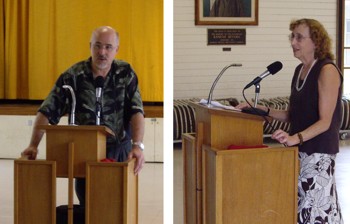July 21 Meeting: Hawaii Transformation Grant and adult mental health issues

Click ![]() here to listen.
here to listen.
Rupert Goetz and Marya Grambs
Dr. Rupert Goetz: Mental Health Transformation Grant: Hawaii is one of 9 states at received $10.95 million over 5 years to transform our mental health system to focus on prevention, effective intervention and recovery, provide coordinated culturally sensitive services, to ensure sustainability and be consumer driven. Hawaii’s system is fragmented and uncoordinated because it grew up piecemeal.
After one year in operation the program has completed a Comprehensive Mental Health Plan and Needs Assessment and a Resource Inventory. Six task groups are working on educating the public, systems integration, consumer and professional development and training, research, evaluation and dissemination, financing, sustainability and criminal justice. This year plans will be prioritized. Year 3 will be implementing data collecting, Year 4, evaluating and realigning and year 5 integrating.
Marya Grambs: Mental Health America: Mental Health problems in older adults are usually overlooked – they are underreported and under-treated, even by the health professionals who care for them. This has a dramatic impact on the quality of the lives of older people and the lives of those around them. One in four older adults have a significant mental disorder (26%), including depression, anxiety, psychosis and dementia. In the next 25 years, the number of older adults with major psychiatric illnesses is expected to more than double from 7 to 15 million individuals as the Baby Boom generation ages.
What is the impact of mental illness in older adults if it’s not treated? People get sicker. They have lowered quality of life -- greater disability and impairment. There’s impact on family and on caregivers and greater use of health care system, poor health outcomes and premature death due to other medical conditions and suicide.
The issue is that older adults do not get adequate treatment for mental health problems. Depression is a major problem. In Hawaii, up to 8 % of older adults not in nursing homes suffer from depression, and yet 70-90% receive no treatment for it, data indicate that 70% of people in nursing homes have depression. But it’s treatable: up to 90% will show significant improvement with treatment.
Why is there such a low treatment rate for depression among older adults? First, family, caregivers, or healthcare professionals do generally not recognize depression symptoms: “Because you are old, alone, sick and there’s nothing to be done. It’s just a normal part of aging.” THIS IS NOT TRUE. Depression is not normal, it’s an illness, and just because you’re old does not mean you have to be depressed.
Handouts for Dr. Goets' talk are:
MHT SIG Overview slides
MHTSIG Poster
Department of Health press release on the first annual Transformation State Incentive Grant meeting:
HONOLULU - To celebrate its first year and report back to the public on progress, the Mental Health Transformation State Incentive Grant (MHT SIG)working group will hold its annual meeting on Wednesday, July 23, 2008 from 8:30 a.m. to 3 p.m. at the Pearl City Cultural Center located near the top of Waimano Home Road. The meeting is open to the public and registration is required by contacting MHT SIG at
transformation@doh.hawaii.gov or by calling (808) 453-6649.
One year ago on July 11, 2007, Hawai'i's effort to transform mental health services through a federally funded MHT SIG was launched at a meeting at the State Capitol. Dubbed by Governor Linda Lingle as a "once-in-a generation opportunity" to transform mental health services, this $11 million five-year grant allows Hawai'i to plan and implement changes to improve the state's the system of care.
Lt. Governor James R. "Duke" Aiona, Jr. and Health Director Chiyome Fukino, MD will open the first annual meeting. SAMHSA Project Officer, Commander David Morrissette will follow with a discussion of transformation efforts being made nationally. The Keynote address on "Trauma and Recovery" will feature Tonier Cain, a consumer advocate. A panel of local experts will follow her presentation with a discussion on the role of "trauma" across the lifespan.
Understanding how many lives, both individually and over generations, have been touched by traumatic events relating to mental health supports closer collaboration between transformation participants who all bring their personal perspectives. In the afternoon, attendees will be able to meet with members of the Task Groups to discuss what priorities are being addressed first.
While this meeting is open to the public at no cost, advance reservations for the Annual Meeting are required. Reservations can be made by contacting MHT SIG via e-mail at transformation@doh.hawaii.gov or by calling (808) 453-6649.



<< Home